Greater than 11 minutes, my friend!
The Less Easy But More Realistic Guide to Becoming a Content Writer I spent 2 years building a lucrative content writing business. This is what I did.
If you’re like a lot of freelancers, you might be wondering:
- Might there be another way to supplement my income?
- Is there something else I should do to increase my income?
- I have a lot of skills. How can I use them to create multiple sources of income?
- Was freelancing a bad idea?
This article is about the 2-year journey of how I became a content writer and exactly what I did to build another source of income, including eventually starting my own content agency.
It’s early 2018. I was in the middle of yet another famine cycle.
My heart was in my throat. That became a normal feeling on the mornings of a famine cycle. Especially when I noticed that late payment for a translation job I did 2 months before still hadn’t come in yet.
The idea had been in my head since 2 years prior in 2016, when I redid my freelance translator website. I didn’t feel confident to write the copy myself, so I hired somebody to do it.
The quote was as follows:
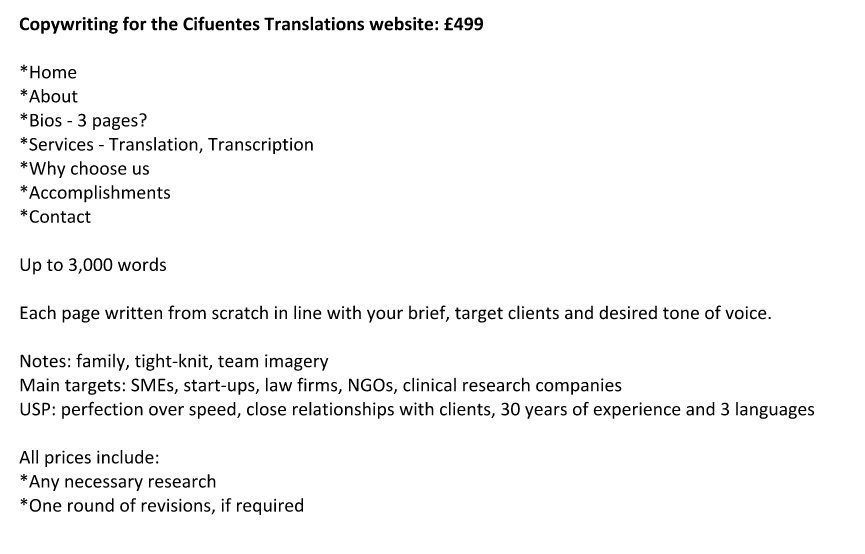
At the time, this was a pretty hefty investment for me (equivalent to nearly $700 in 2016). But, I wanted the best for my business.
I received and uploaded the copy I paid for. I had to revisit and rewrite it a few times during the lifetime of my translation website. I realized that this was something I could do – and better. It took me a few more years before I took any action on this realization.
It was in 2018 when I decided to use my skills to get into copywriting. This path transformed into the lucrative content writing business I have now.
How to become a content writer
After reading this article, you’ll know:
- What I did,
- How I did it,
- What resources to use for learning more about content writing on your own,
- How to become a content writer!
What is content writing?
After a while of diving deep into the freelance writing world, I’ve noticed a clear distinction – in my opinion – between copywriting and content writing. I have a clear preference for the latter.
Copywriting is writing for:
- Ads
- Sales pages
- Sales emails
- Landing pages
- Website copy
- Microcopy
….etcetera.
It’s a salesperson in writing. Its purpose is to convert.
I have nothing against sales, but I prefer the lure of content.
Content writing is:
- SEO writing
- Blog posts
- Courses
- Resources
- How-to guides
- Social media content
The purpose of content is to educate, inspire and build trust. It establishes credibility. It’s a way to share your experience.
I took all the (free) courses about copywriting. I devoured every blog post on the internet.
After two years as a content writer, the skills I have found to be the most useful are:
- SEO – understanding how SEO writing works is by far my most valuable asset
- Writing for internet consumption
- Basic design
- Niche expertise
- An open mind and a low ego (yes, these are skills to learn)
- Research & interviewing
- Networking
Most of these skills are transferrable. They’re useful whether you want to be a content writer or a strategist.
Now I’ll tell you how my time is spread out as a content writer.
How do content writers spend their time?
I can’t tell you about a “day in the life of”, because I do several things at once. Freelance-wise: I’m a translator and a content writer. But I’m also a blogger (a passion project – unbillable), and I run a b2b content marketing agency.
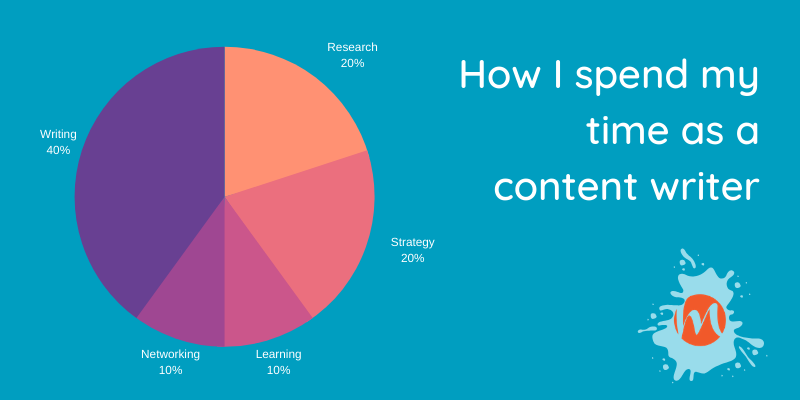
So I’ll take my time as a content writer and break down the percentage of my time from that:
- 20% Research. Not just about the topic I’m writing about. I do keyword research, customer research, and I study blogs similar to what I’m writing. Particularly those than rank on the first page of Google.
- 20% Strategy. Planning how all the blogs will work together. Documenting the purpose of what I’m writing. Planning headlines and sub-headings.
- 10% Learning. Most of my learning comes from other blogs or influencers on LinkedIn. I sometimes listen to podcasts. Sometimes I also take courses. My short attention span and commitment issues make me stick to blogs.
- 10% Networking. I spend 1 hour a day networking on LinkedIn. That combines writing and actually having conversations. This helps get clients, but also helps me learn. You also need a network for content promotion and distribution.
- 40% Writing. I spend a bit less than half of my time actually writing.
I should also mention re-optimizing. I spend a lot of time going back to old posts and updating them. For me and my clients – to test theories and see if we can improve metrics.
Anyway, I digress.
You may be curious about what I mean when I say strategy. Is that something you need to learn as a content writer?
What is content strategy
I do not think that content writers need to know how to create a content strategy. But they need to understand one. And they need to know how to write strategic content.
I’m a bit of a control freak (working on it), so I prefer to design strategies myself. I want the writers who I hire to understand strategy. Otherwise, their content – however good- won’t achieve my goals.
Content strategy is your plan for achieving a specific goal with content.
It’s aligning what you create with your ultimate business objective. The person creating the content does not need to create the strategy. But they do need to understand it.
I won’t go to deep into content strategy here. That’s not why you’re reading this. Let’s move on.
I wrote a non-overwhelming business plan for freelancers
How much do content writers make
Well, it depends.
Just like most freelance services, your salary depends on:
- How much you can niche down and
- What results you can provide
You’ll see on some freelance websites that people are asking for $10 for a 1,000-word post. Big-time freelance writers can ask for thousands for a single post (usually longer than 1,000 words, though 😅).
According to Indeed.com, the average content writer in the US makes $17/hour, but I have never accepted that low of a rate. It also says the average translator salary is $19/hour, so I’d take it with a grain of salt. The masses of “bottom feeders” probably skew this data.
Payscale.com says that the average salary for a content writer is $45,377.
The average doesn’t matter if you’re going to be awesome.
If you can prove that your content has converted into qualified traffic or sales, you can charge more.
A $10 blog post is a commodity – content for content’s sake. A $500 blog post is an investment, with results expected.
Pricing is whatever you make of it. The more value you can demonstrably provide, the more you can ask for.
Okay, so now let’s look at how you can actually get into the business of content writing.
How to start content writing
I’ll move quickly through the main step, which is to write a lot.
My first blog was a Garfield fan club website in the late 90s. I even had a member’s area.
Then I had a couple of other random blogs for personal use. When I wanted to build a real audience, I started a pretty terrible blog back in 2013 about fitness and nutrition. I won’t even link to it, it’s too embarrasing.
Your first content will probably be bad. That’s okay.
You need to get through the bad stuff to start writing the good stuff.
No writer, designer, YouTuber or anybody who does anything good started by doing it well. They just started by doing it. But you need to start writing stuff.
This post isn’t about how to write well, it’s about how to make money writing content.
Start writing daily now so you can speed through the learning curve. Don’t wait for perfection. That will just slow your learning.
So that’s all I’ll say about that.
The rest of this section will cover how to start a business content writing.
It’ll cover:
- Freelance writing niches
- Writing portfolio examples
- How to pitch freelance writing
- How to get a writing job
- Best free content writing training and resources
- Best content writing tools
Let’s dive in:
Freelance writing niches
Your niche is your most valuable asset.
Put yourself in your prospect’s shoes.
What would you invest more money in? A writer who can:
- Establish you as an authority
- Build trust among your peers
- Show that you know what you’re talking about
- Create content that’s loved and gets shared
- Knows how to get your content ranked
- Makes you seem like a genius badass
Or a writer who:
- Writes super generic content
- “Can write about anything”
- Writes summaries of a few articles they found on Google
- Doesn’t know anything about your sector or audience
- Writes awkwardly or like a higher schooler
But not all good writers know about SEO, social media, or every single vertical on earth.
Choose a niche, a specific need (i.e. SEO or thought leadership) or a specific audience (i.e. femtech or real estate). Dive deep into it.
That’s how you’ll set yourself apart from the rest. That’s how you can charge bigger premiums.
Here’s a list of most profitable freelance writing niches, borrowed from Elna Cain.
- Finance
- Personal finance
- Accounting
- Financial stocks
- Cryptocurrency
- Budgeting/frugality
- Digital marketing
- Affiliate marketing advice
- Email marketing
- Social media – Pinterest, Instagram, Snapchat etc…
- Push notifications
- Search engine optimization
- eCommerce
- Education
- College life
- Education manuals/curriculums
- News topics
- Daycare and Pre-k
- Alternative health
- Organic Living/Non-GMO
- Specialty diets – Keto, Intermittent, Paleo, etc
- Supplements
- CBD oils
- Bodybuilding
- Addiction Recovery
- Running
- Senior living
- Video scripts
- Course lessons
- Promotional campaign videos
- Tripwire video copy
- Sales page video copy
- Food and wine
- Cooking techniques
- Product reviews
- Recipe developer
- Food events
- Industry news
- Wine/beer copywriting
- Email
- Newsletters
- Email sales funnel
- Landing page copy
- Marketing material
- Email campaigns
Choose one and dive deep!
Writing portfolio examples
I already had years of translation experience when I became a writer.
I thought it would be an easy transition.
I was disappointed: I couldn’t use my translation work in my writing portfolio.
I also realized that content buyers don’t associate translators as writers.
We are writers. But my online translation profiles confused content buyers. My positioning was off, and nobody understood what I did.
Instead of trying to educate them, it was easier for me to rebrand as a writer.
To do this, I had to start from zero.
I started by reaching out on Facebook Groups to entrepreneurs who may want some free content.

I gave them free copy in exchange for a portfolio piece and a testimonial on LinkedIn.
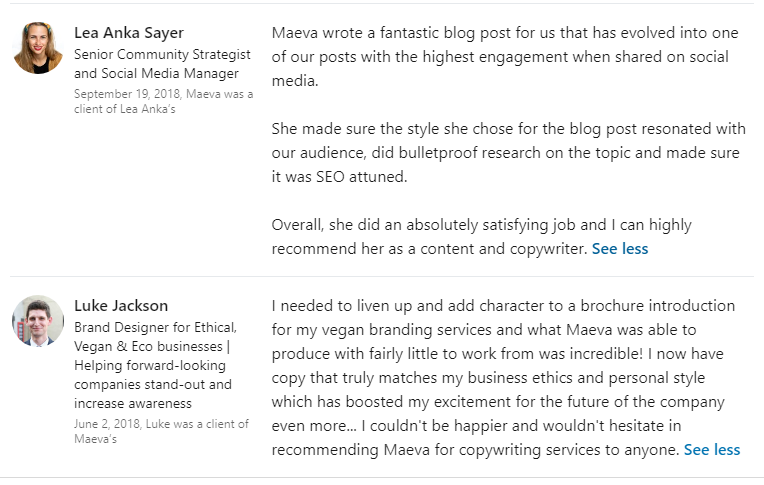
I reached out to local entrepreneurs to see if I could be a volunteer team member. I became head of content of this local event for a short time. I also built some solid relationships in Barcelona’s startup scene.
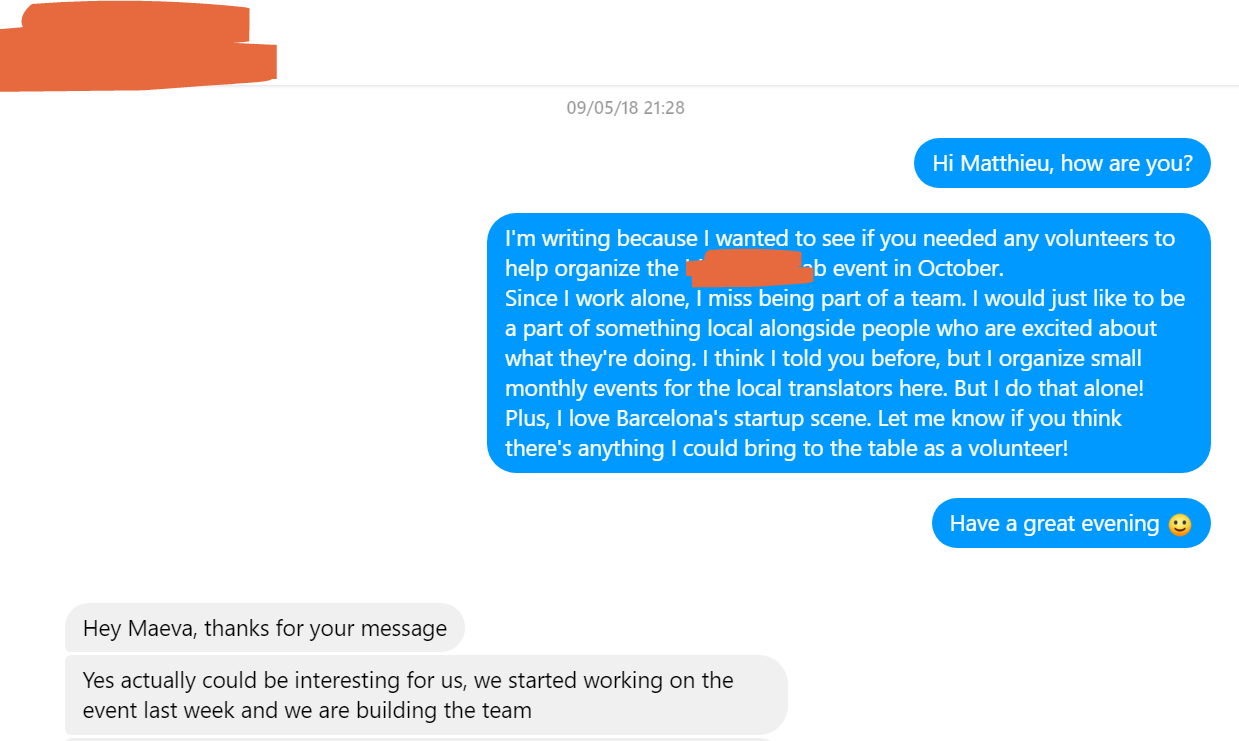
This also gave me more solid testimonials a few months later:

The main thing I had to do was swallow my pride, work for free and do my best.
I don’t really have a portfolio anymore.
Now, I usually send prospects links to published articles I’ve written.
Being able to show growth is the greatest portfolio piece of all.
But I’ll still show you what my portfolio looked like at the end of 2018:
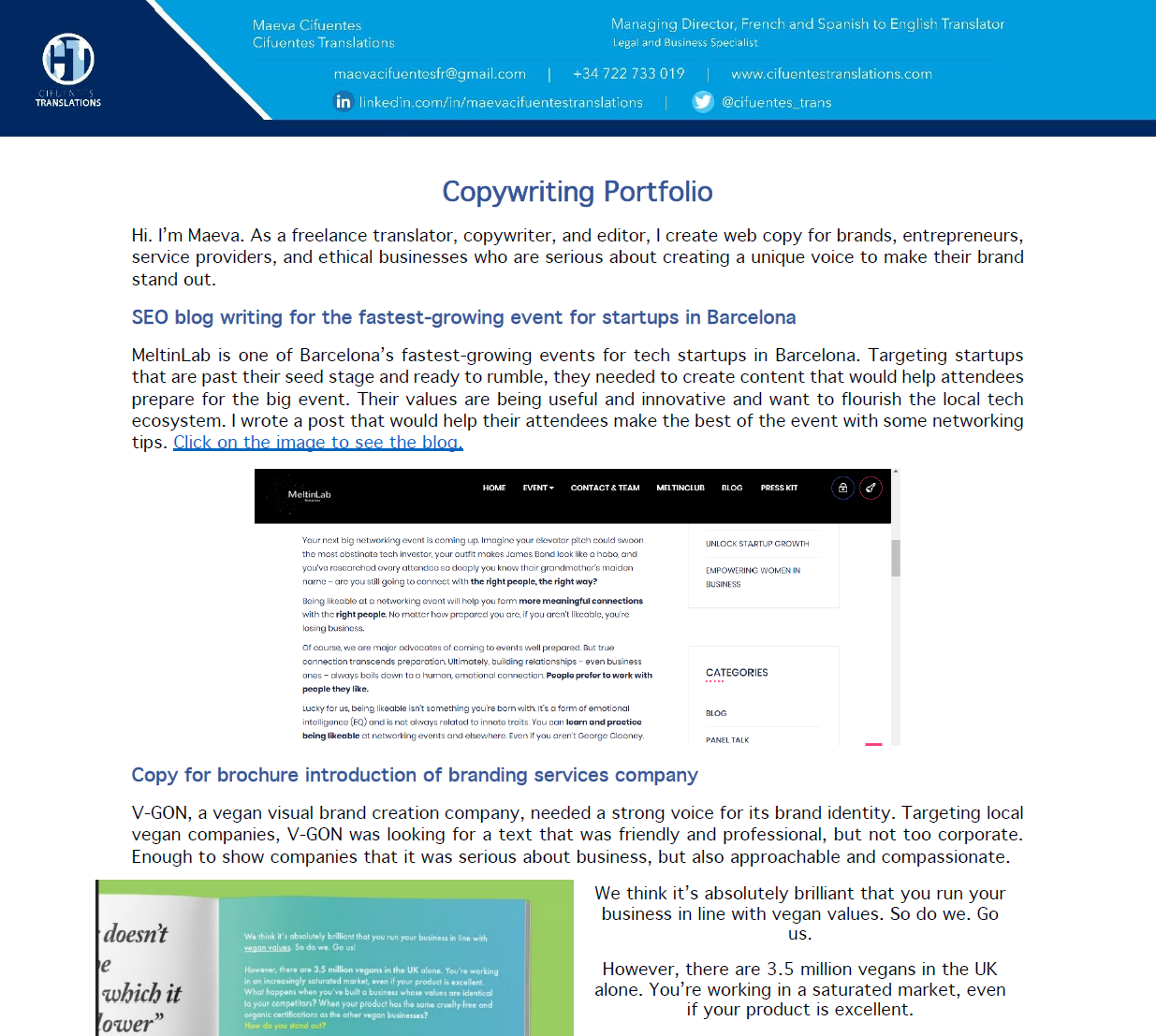
My writing portfolio when I just started
I wouldn’t say I love it now, but it gave me something to show potential clients.
The formula was:
- Presentation of the brand
- What I was supposed to achieve
- The content (a link to it, if published online)
I also threw in some of my marketing translations to add some meat to it.
Start building a portfolio to have something to show prospects. Don’t obsess too long about it – once you have a few excellent things, you can start charging.
How to get a freelance writing job
✅ The best writing jobs I have ever gotten are through networking.
I met my client today – whose blog I now run 100%, who flew me to Cartagena for an industry event, and who has allowed me to share stellar results to close more clients – at a birthday party.
The birthday boy, I met at a startup networking event.
Without going out into the world and blabbering on about being a writer, this would’ve never been possible.
✅ The second-best place I’ve gotten writing jobs from is LinkedIn. LinkedIn is a goldmine for people who use it right.
You need to be active on the platform, post frequently, and engage with other people’s content. It’s a long-term game.
✅ The third-best place I’ve found writing jobs are through Facebook Groups. In expat groups, digital nomad groups, entrepreneur groups, you name it. People post jobs on there all the time.
I got a few writing jobs from platforms like Upwork, but I found it challenging to find ambitious and passionate clients on there.
In any case, there are a few profitable freelancing platforms that have well-paid jobs. I wrote a blog post about them here.
Being a content writer means you’re a life-long student.
Hence the next section, where to learn about content writing.
Best free content writing training
Okay, let’s dive into my favorite part: learning!
I talked a lot about how to get into the business of content writing. But you do need to learn about how to do the content writing.
Here are my favorite resources:
1. Hubspot Academy
One of my favorite online resources, HubSpot Academy offers free courses on inbound, social media, cotent marketing and more.
2. Ahrefs Blog
Ahrefs is a link building tool and it has a very actionable, easy-to-apply and educational blog about SEO and link building.
3. Brian Dean’s Blog Backlinko
Brian Dean, the king of SEO has a great blog with so much AMAZING content I haven’t even been able to go through it all yet. Everything is highly actionable with a ton of screenshots – it makes it easy to quickly apply what you’ve learned.
4. Moz Blog
Another inbound and SEO blog with in-depth guides. You really never need to go “officially” study SEO with these blogs available online for free.
5. The Marketing School Podcast
A 5-7 minute long daily podcast by marketing experts Neil Patel and Eric Siu. I listen to this every morning while I shower and get inspired to test something new every time.
6. Content Mavericks
Non-SEO content marketing training blog. Again, lots of actionable examples and zero fluff.
6. Google Analytics Academy
Learn about dataand how to use Google Analytics to better drive your content strategy. Get a free certification.
7. Facebook Blueprint
A free course and certification by Facebook itself on how to market with Facebook and run ads.
Best content writing tools
I wouldn’t want to say good bye without giving you a few tools I use to write good content.
To write clearly I use the Hemingway Editor. It’s a free tool that grades your writing based on how easy it is to read. I try to aim for grade 5 or below.
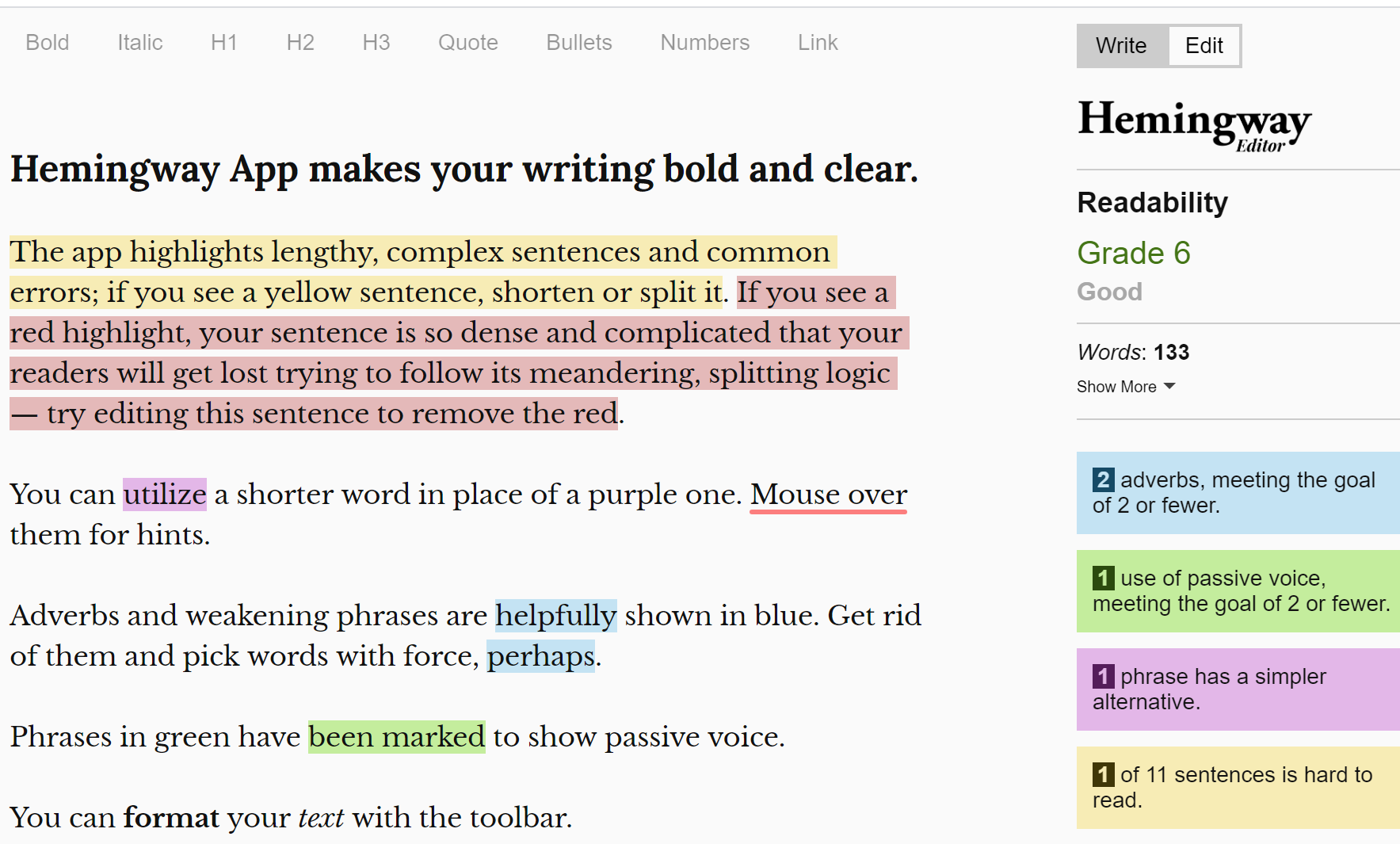
To write correctly I use the Grammarly Plugin.
When I work for clients I always get a reviewer, though. I write too fast and always have typos in my personal writing.
For keyword research I use Ahrefs. It’s pretty expensive but the best keyword research tool on the market. Without it, I can’t get the results I need for my clients. Alternatives are Mangools, SEMRush and Ubersuggest.
You can see some more tools and resources I use on my resources page.
Go out and become a content writer!
I hope this article will be helpful to you.
It’s been a long journey with a lot of trial and error for me, and I still have a lot to learn.
After writing a lot, I got very interested in building a strategy, teams and systems and launched my agency at the beginning of this year.
Let me know how you liked this post in the comments below, and what I could add to make it more helpful to you!
Thanks for reading.




